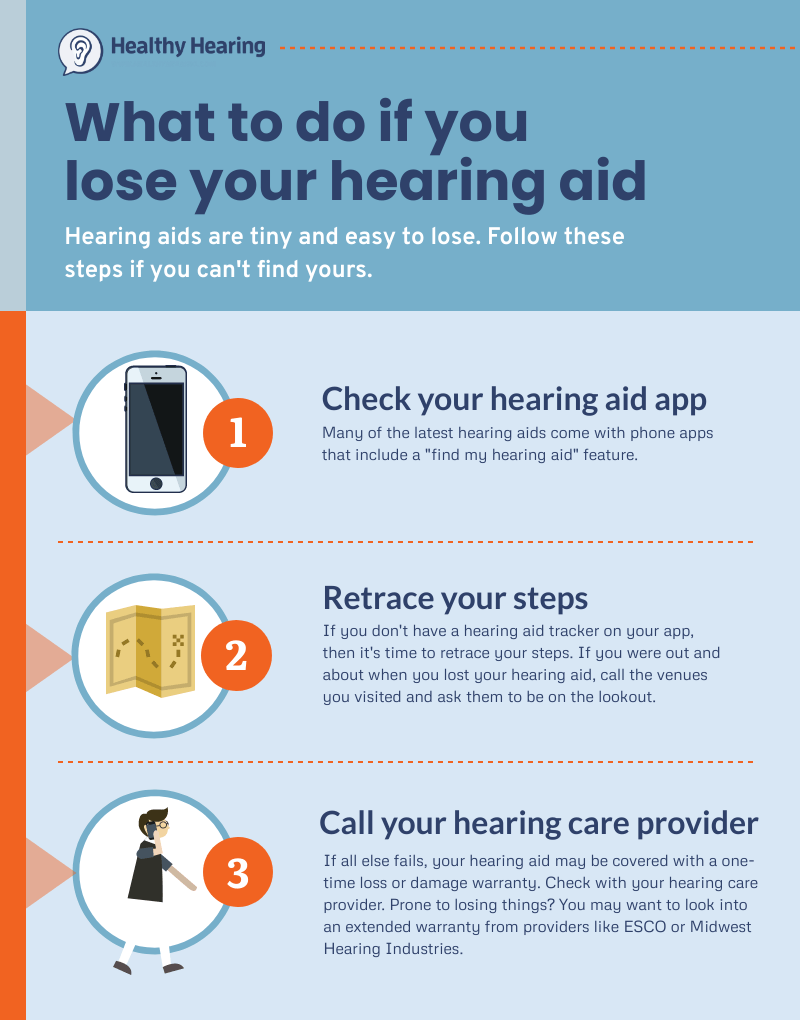|
www.HealthyHearing.com |
Lost your hearing aid? Here's what to do ASAP
Contributed by Joy Victory, managing editor, Healthy Hearing Key points:
Lost your hearing aid? It happens more often than you might think. Hearing aids are tiny and can be so comfortable you may not even notice right away if one falls out. Fortunately, there are ways to lower your risk of losing your hearing aids—and strategies to help you find them if they do go missing.
What should you do if you lose your hearing aid?If you find that you've lost a hearing aid, don't panic. These tips can help you to locate or replace your lost device. .jpg)
works for Oticon Companion app users.
Check your hearing aid tracker appIf you have a modern hearing aid, your hearing aid may come with a hearing aid app that has a "find my hearing aid" feature. This can be invaluable and should be the first thing you do if a quick search of your immediate surroundings comes up short. For example, Oticon's Companion app comes with this feature and is compatible with many of their modern Bluetooth/2.4 GHz models such as Oticon Intent, Real, Opn and others. To enable and use the "Find my hearing aids" feature on compatible Oticon devices, you can follow the advice below (also found on page 21 of the Oticon Companion app user manual): "If you are unable to find your hearing aids, the app can show you a map with the last known location of the paired hearing aids when the app was running. To locate your missing hearing aids: 1. On the tab bar, tap Hearing aids. 2. Tap Find my hearing aids. The hearing aid icons indicate how close you are to each connected hearing aid. On the map, the green marker indicates that there is connection between your hearing aid and device. The red marker indicates that the connection is lost. Tap the icon to see the date, time and location of the last connection. For best results, it is recommended to keep the app turned on, either actively being used, or running in the background." Many other major hearing aid manufacturers have similar hearing aid tracker functions, including: Keep in mind that older hearing aids may be less likely to have this option available compared to newer models. Retrace your stepsWhile this may seem like frustratingly obvious advice, retracing your steps just before you lost your hearing aid can pay off. Even if you've done so already, try once more. Give some serious thought to when you are sure you last had your hearing aid and what you were doing at the time. How did you notice your hearing aid was missing and where were you then? Report your lost hearing aidIf you were in a public venue or business when you lost your hearing aid, either call them or visit. Good Samaritans are everywhere, and one of them may have turned your valuable hearing aid into the "lost and found." Talk to someone at the venue and describe what your hearing aid looks like. If they don't have it, leave your name and number and request a phone call if the hearing aid turns up. It may help to check back several times. Enlist the help of family and friends to help you look for your hearing aid at home or wherever you think it could be. 
lose your hearing aid. Call your hearing care professionalIf retracing your steps and searching your home, office, car, purse or briefcase doesn't help, contact your hearing healthcare provider. Most hearing aids are covered by warranties from the manufacturer for one-time loss and damage for at least the first year and sometimes longer. Your provider will easily be able to tell you if you are covered. They also may know if your app has a "find my hearing aid" feature and can help you use it if you're not sure how to use the app. Check your warrantySome hearing aid wearers opt to purchase additional coverage for their devices through third-parties such as ESCO or Midwest Hearing Industries. Others choose to add a special rider to their existing homeowner's insurance to cover hearing aid loss and damage. If you are covered by the manufacturer or one of these additional options, ask your provider about next steps. Sometimes, you will need to supply a simple notarized letter for the manufacturer or insurer. Be aware that even if the hearing aid is covered and you can get a replacement at no cost, your hearing care professional may still charge you a small fee for their time or for fitting the new device when it arrives. How to prevent losing your hearing aidKnowing what to do in the event you lose a hearing aid is important, but most wearers would prefer to avoid loss altogether. Here are some things you can do to prevent lost hearing aids:
If you are the caretaker of a person who uses hearing aids, go over all these tips with them and set up a routine as much as you can for how and when they use and remove their hearing aids. Talk to staff if your loved one is in a nursing home so that they know the routine, too. Bottom lineLosing a hearing aid can be frustrating, but taking preventive steps and knowing where to turn for help makes a big difference. If you need a replacement or professional support, use our directory to find a trusted hearing specialist near you. Joy Victory, managing editor, Healthy Hearing
|
Featured clinics near me
Earzlink Hearing Care - Reynoldsburg
7668 Slate Ridge Blvd
Reynoldsburg, OH 43068

Find a clinic
We have more hearing clinic reviews than any other site!



 Joy Victory has extensive experience editing consumer health information. Her training in particular has focused on how to best communicate evidence-based medical guidelines and clinical trial results to the public. She strives to make health content accurate, accessible and engaging to the public.
Joy Victory has extensive experience editing consumer health information. Her training in particular has focused on how to best communicate evidence-based medical guidelines and clinical trial results to the public. She strives to make health content accurate, accessible and engaging to the public.